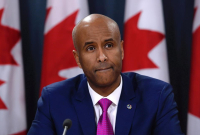Support strong Canadian climate journalism for 2025
Would-be Canadians need more than just a desire for a better economic future if they expect to be granted refugee status in this country, Prime Minister Justin Trudeau said Thursday.
Trudeau, speaking at an event in Charlottetown, pointed to the case of 6,300 Haitians who have crossed illegally into Canada from the U.S. in recent months to request asylum. Statistics released this week show that of the 298 Haitian cases that had been heard by the end of October, only 29 were granted protection.
"Refugee status means that you have nowhere to go, you can not be protected by your home state," the prime minister said. "It's not just a question of, 'I'm looking for an economic future, so I want to come to Canada.'"
The Immigration and Refugee Board is working its way through more than 14,000 cases lodged by people who've crossed illegally into Canada from the U.S. since February. So far, they've heard 1,572 and the overall acceptance rate is about 60 per cent. Haitians make up the majority of claims.
But though that country has economic challenges, it's far from a failed state, Trudeau noted.
"There are people in different parts of the world who need help more, who have a more urgent need," he said. "We must ensure that our immigration system remains intact and that Canadians continue to have confidence in our immigration system."
The analysis of who has crossed the border illegally this year — along with the results of their IRB hearings — was part of a meeting Thursday between federal and provincial officials overseeing irregular migration at the border.
The task force was established at the height of a surge in asylum seekers this summer coming into Quebec from New York.
The numbers have since dropped — 5,712 people were apprehended by the RCMP between official border points in August, while in October it was just 1,890.
Contingency plans in the event there's a new surge continue to be tweaked, said Public Safety Minister Ralph Goodale.
Earlier this week, the U.S. lifted a ban on deportations to Haiti, placing nearly 60,000 people on notice that as of the summer of 2019 they will need to return to that country or find another way to stay in the U.S.
The American announcement in May that temporary protected status for Haitians was under review prompted some of the influx at the Canadian border, but Goodale said the long lead time in place gives Canada time to prepare if there is another wave.
He said he expects that should the U.S. go ahead and also end a ban on deportations to El Salvador covering nearly 262,000 people, there should be a similarly long period before it would go into effect.
Much of the contingency planning involves what happens when or if the asylum seekers arrive.
But the discussion also includes what happens to those whose claims ultimately fail to be approved, or who withdraw their applications. At that point, they are subject to deportation from the country. Goodale acknowledged, however, there's currently a major backlog in the removals program.
"We are factoring that capacity issue into our planning," he said.
With the process of deciding on claims expected to take months, many asylum seekers have been given work permits, are sending their kids to school and integrating into the community, said Quebec Immigration Minister David Heurtel.
Whether that makes it fair to then deport them if their asylum claims fail is a question better left to the federal government, he said.
"For us, it's important that these people . . . have to be treated with compassion and humanity," he said.
Immigration Minister Ahmed Hussen said while children have a right to go to school whatever their immigration status, at the end of the day, the law is the law.
"The principal applicants, after exhausting their appeal mechanisms, will be put on the removal stream and they will have to leave our country," he said.
"That's our law."





Comments